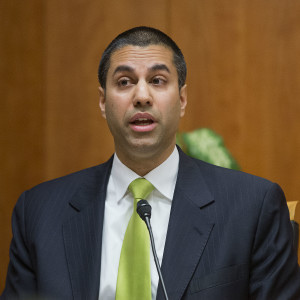Net neutrality supporters are going on the offensive over the new Republican chairman of the Federal Communications Commission’s reported plan for dismantling open internet rules passed under the Obama administration.
Advocates say Chairman Ajit Pai’s plan to repeal the rules and instead ask internet service providers pledge to follow open internet standards places too much trust in large corporations like AT&T, Verizon, and Comcast.
“If these reports are true, Chairman Pai is preparing to give dominant cable and telecommunications companies what their D.C. lobbyists have dreamed of for years: voluntary net neutrality ‘rules’ where consumer protection is no more than ‘trust your cable or internet provider,’” Chris Lewis, vice president at the pro-net neutrality group Public Knowledge, said Friday.
According to sources attending a meeting between Pai and internet service providers (ISPs) last week, cited by Reuters, Pai could offer a plan to repeal the rules barring ISPs from blocking, throttling, or favoring web traffic for a fee (a practice known as paid prioritization) as early as April. In exchange, Pai reportedly wants providers to commit to upholding those standards in their service agreements with customers, which would subject ISPs to legal action if they did otherwise.
Under the plan, the Federal Trade Commission would oversee compliance, returning the authority the agency had to police ISPs before the FCC reclassified them as public utilities under Title II of the Communications Act. Reclassification from an information service under FTC jurisdiction to a common carrier service under FCC oversight was the portion of the FCC’s 2015 Open Internet order Pai disagreed with most.
The report is consistent with statements Pai has made since taking over the agency in January.
“The end goal is to preserve the free and open internet that we had for two decades starting in the Clinton administration,” Pai said in February. “That’s a framework that’s served the American public very well and that’s a framework that I hope we’ll be able to return to on a bipartisan basis in the future.”
Soon after President Donald Trump’s election victory in November, Pai said the new Republican majority at the agency would “fire up the weed whacker and remove those rules that are holding back investment, innovation, and job creation.” Republicans and ISPs have leveled those criticisms against the rules, which potentially give the FCC the power to regulate the price of service (though previous Chairman Tom Wheeler pledged to forbear from doing so).
Public Knowledge, whose former president and founder served as a top aide to Wheeler when the rules were passed, warned since day one of Pai’s chairmanship he would seek to undo the rules. This month’s congressional repeal of net neutrality-rooted privacy rules, which Pai stayed before taking effect, were a precursor.
“Federal courts have upheld the current rules and investment in the internet economy has continued under them to the tune of billions of dollars,” Lewis said. “Chairman Pai and President Trump’s interest in eliminating these simple protections is their latest attempt to take a weed wacker (sic) to basic consumer protections, following the repeal of broadband privacy rules.”
Some evidence suggests broadband investment has declined since the passage of the net neutrality rules.
Lewis added that voluntary compliance would let ISPs “decide ahead of time what rules they would like to follow and when they can change those rules” and lead to “massive market abuses including unreasonably low data caps, inflated prices for some content and preferring cable/broadband content over smaller, independent competitors.”
Democrats in Congress supportive of the rules agreed.
“The only way to protect a free and open internet is with strong net neutrality rules of the road – not voluntary guidelines – that ensure businesses, innovators and families can use the world’s greatest platform for commerce and communications,” Massachusetts Sen. Ed Markey, who sits on the committee overseeing the FCC, said Friday. “Chairman Pai’s proposal would put the future of an open and free internet in the hands of big corporations and the powerful few at the expense of consumers.”
Markey warned “an historic political firestorm” would result if “anyone at the FCC, in Congress or in the broadband industry attempt to weaken or eliminate the Open Internet Order.”
South Dakota Republican Sen. John Thune, who favors codifying net neutrality protections via an act of Congress, said in January the threat of FCC repeal “may help inspire some of my Democrat colleagues to embrace the idea that a bipartisan, legislative solution is the best possible outcome.”

